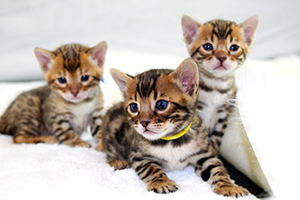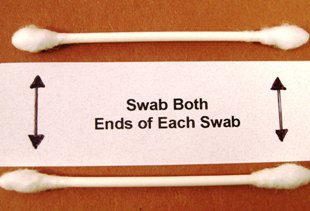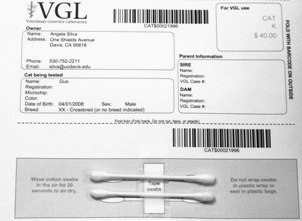Quick Summary
Click here for Price and Turnaround Time
Phenotype: The common domestic cat blood types are A and B, and a third rare type "AB" is also known. Cats with blood type A have naturally occurring anti-B antibodies at a low concentration and cats with blood type B have naturally occurring anti-A antibodies at a high concentration. Cats with the rare "AB" type do not have anti-A or anti-B antibodies and are thus universal recipients for blood transfusion.
Mode of Inheritance: Order of dominance is A (N in this test) > c > b
Alleles: N = A, or possibly rare, unknown B or AB alleles; b# = known B alleles (3 alleles exist); c = known AB allele
Breeds appropriate for testing: Many breeds (excluding wildcats and hybrids)
Explanation of Results:
- Cats with N/N1 genotype will likely have blood type A.
- Cats with N/b# genotype will likely have blood type A2 and are carriers of B blood type.
- Cats with N/c genotype will likely have blood type A3 and are carriers of AB blood type.
- Cats with c/c genotype will have blood type AB.
- Cats with c/b# genotype will have blood type AB and are carriers of B blood type.
- Cats with b#/b# genotype will have blood type B. Matings of a blood type B queen to an A- or AB-blood type tom can cause neonatal isoerythrolysis (a potentially lethal disease) in the litter of kittens.
1 The blood group test is designed to detect specific genetic variants that result in blood types B and AB. The absence of those variants is reported as N. In most cases, the N allele corresponds to the common, unchanged gene that results in blood type A. However, occasionally, one or both N alleles may correspond to a rare and yet unknown AB and/or B type allele. In those rare circumstances, a cat with N/N genotype may be:
- Blood type A carrying a rare, yet unknown AB allele;
- Blood type A carrying a rare, yet unknown B allele;
- Rare blood type AB;
- Rare blood type AB carrying a rare, yet unknown B allele; or
- Rare blood type B.
2 If the N allele is a rare, unknown AB, the result could be a cat with blood type AB carrying B; if the N allele is a rare, unknown B allele, the cat could have blood type B..
3 If the N allele is a rare, unknown AB or B allele, the result could be a cat with blood type AB, or a cat with blood type AB carrying an unknown B allele.
The table below shows the resulting blood type for each possible genotype.
* The blood group test is designed to detect specific genetic variants that result in blood types B and AB. The absence of those variants is reported as N. In most cases, the N allele corresponds to the common, unchanged gene that results in blood type A. However, occasionally, one or both N alleles may correspond to a rare and yet unknown AB and/or B type allele.
Cat DNA tests are carried out using cells brushed from your cat's cheeks and gums using household cotton swabs.
The cat DNA submission form with instructions and a place to tape the cotton swabs is sent to you via email after you place an order, and can be printed from your home computer. DNA test kits are no longer mailed.
Instructions
Step-By-Step:
1.
 Purchase regular household cotton swabs for cat DNA collection (the cotton swabs can be purchased at a pharmacy or drug store)
Purchase regular household cotton swabs for cat DNA collection (the cotton swabs can be purchased at a pharmacy or drug store)
2.

Make sure the cat has not had anything to eat or drink for at least 1 hour prior to collecting sample.
When swabbing kittens, isolate each kitten from the mother, littermates and any shared toys for 1 hour prior to swabbing. Kittens should not have nursed or eaten for 1 hour prior to collecting sample.
If collecting samples from more than one cat, make sure to sample one cat at a time and wash your hands before swabbing another cat.
3.
 Use both ends of the two cotton swabs for a total of four swabs.
Use both ends of the two cotton swabs for a total of four swabs.
4.
Place the cotton head of the swab between the cat’s gums and cheek and rub or rotate the swab back and forth for 15 seconds. Repeat with each cotton swab head, for a total of 4 swabs. We recommend swabbing a different area of the gums with each swab head.
5.
Wave the swab in the air for 10-15 seconds to air dry it before attaching it to the submission form.
6.
 After swabbing the cheek and gums, tape the cotton swabs to the bar-coded submission form printed from your MyVGL account.
After swabbing the cheek and gums, tape the cotton swabs to the bar-coded submission form printed from your MyVGL account.
ATTENTION:
- Do not collect saliva/drool – the key to obtaining a good sample is getting cheek cells on the swab.
- Do not rub swab on the cat’s tongue or teeth – this will result in poor quality sample.
- Do not collect a sample from a kitten that has recently nursed – the mother’s genetic material can rub off on the kitten’s mouth and contaminate the sample.
The AB system is the major blood group system in domestic cats. The common blood types are A and B. Cats with blood type A have naturally occurring anti-B antibodies at a low concentration and cats with blood type B have naturally occurring anti-A antibodies at a high concentration. A third rare type "AB" is also known. Cats with the rare "AB" type do not have anti-A or anti-B antibodies and are thus universal recipients for blood transfusion. It should be noted that the nomenclature of cat blood groups can be confusing; the "AB" type is not the result of presence of the A and B blood groups.
The presence of naturally occurring antibodies makes it necessary to cross-match blood for transfusion purposes. In cats, these natural antibodies can also cause neonatal isoerythrolysis (NI). NI occurs when a B type queen is bred to an A or AB type tom and the A and AB type kittens absorb antibodies from the colostrum when they nurse. The hemolytic disease that ensues can be lethal.
The A, B, and AB blood groups are genetically determined. To avoid confusion, the following nomenclature has been adopted for the blood group alleles: "N" represents blood type A, “b#” represents blood type B and “c” represents blood type AB. The order of dominance is A>c>b. Genetically, cats with type A can be N/N, N/c or N/b1, N/b2, N/b3, cats with type AB can be c/c or c/b1, c/b2, c/b3 and cats with type B are b#/b#.
Blood type A is the most common among cats but the frequency varies significantly by breed and geographic location. Breeds that have a rare occurrence of a blood type B allele are Siamese, Burmese, Russian Blue and Ocicat. Breeds with high frequency of the blood type B alleles are Exotic Shorthair, British Shorthair, Cornish Rex and Devon Rex. The frequency of the AB type is reported to be less than 10% depending on country and breed.
Three independent genetic variants, reported as b1, b2 and b3, resulting in B blood type have been identified. Additionally, the variant resulting in AB blood type, reported as c, identified in Ragdolls and some random bred cats was identified in Dr. Leslie Lyons’ laboratory at the University of Missouri. Animals can be tested for these alleles at an early age and breeders can use this test for mate selection to avoid NI in kittens.
The DNA blood group test identifies cats that are predicted to be serotype B (b#/b#) or that are B carriers (one copy of b#). It also identifies some Ragdolls and random bred cats that are serotype AB (c/c and c/b) or AB carriers (N/c). Cats that are not genetically c/c, c/b# or b#/b# could be serotype A or another serotype AB (yet to be identified), thus the ambiguous allele is reported as N since they do not possess any known variants.
